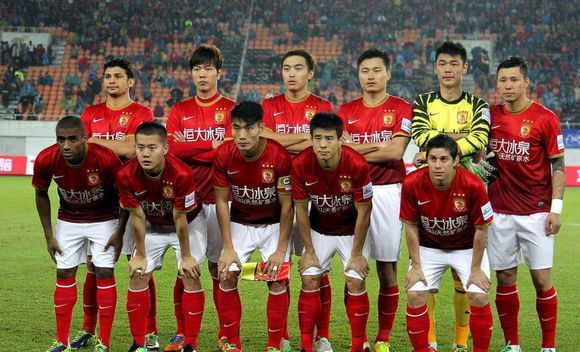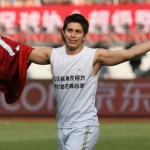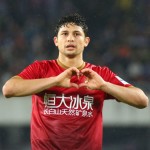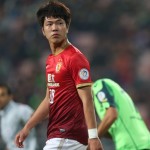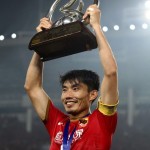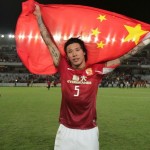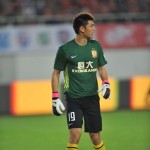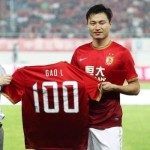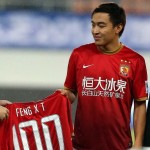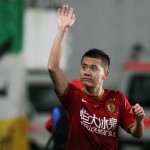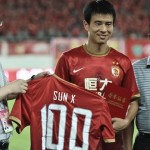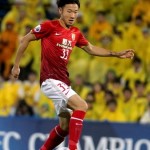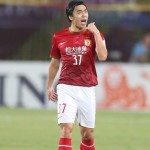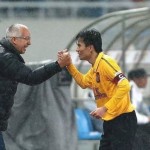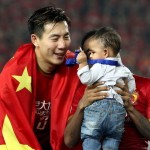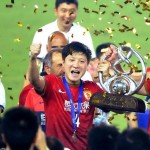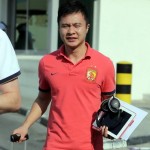After the second leg of the CFA final last Saturday, which saw Guizhou Renhe deny Guangzhou Evergrande the treble, four Evergrande supporters and sometime contributers to (Damian, Piers, Fee, and GZBiffo) gathered to discuss which players had been most vital to their team’s incredible dominance of 2013.
Each fan (and another who couldn’t attend) had ranked the 18 squad members who had played more than ten times this season in order of what they felt was their importance to the club’s success. With 20 points allocated to the top rated player, 18 to the second, 16 to the third, 15 to the fourth, and so on in increments of one, each player would score between a minimum of 5 and a maximum of 100 points between the five judges.
Below is the overall ranking of the squad, along with the fans’ justifications for each player’s position. Apart from outcast Lucas Barrios the foreign players come out top, with the three South American attacking players clearly regarded as the most influential (only a single voter excluded one from their top three). The highest-ranked players that follow are mostly components of the defensive unit that has conceded just 40 goals in fifty-one competitive matches so far this year.
Given the nature of the scoring system which is based on ordering players by their contribution over the season, the points out of 100 given below are NOT supposed to indicate overall scores for the players; rather they are provided merely to show clusters and gaps in the voting.
[Rank. Name (Ranking Points; Appearances (as sub); Goals; Yellow Cards; Red Cards) Shirt no.]1. Dario Conca (92 pts; App 45 (1); Gls 26; YC 2; RC 0) No. 15
The top choice of the majority, the Argentinian maestro’s final season in Guangzhou after joining from Fluminese in mid-2011 has undoubtedly been his best. Despite his attempts to force a move back to Brazil in the off-season being rebuffed, under Lippi he seemed to become much more settled and contributed excellent performances with astounding consistency. As Piers put it, the ‘pint-sized matador’ has been the ‘metronome’ of the side, regularly flicking the ball past onrushing opponents and building momentum in their wake. A real all-rounder, he could be found nodding a goal-bound shot off the line one minute, and fizzing home a long-range screamer the next. He seemed genuinely moved at his cup final farewell performance, and as he returns to Fluminese leaves a gaping hole in midfield that will be very tough to fill.
2. Muriqui (90 pts; App 44 (3); Gls 24; YC 7; RC 0) No. 11
Described by Jeonbuk coach Fabio Lefundes as “the best player in the Asian Champions League” back in March, the Brazilian long-termer indeed excelled in the big cup this year, breaking the all-time top goalscorer record with thirteen strikes and eventually being officially named MVP of the competition. He also picked up the AFC Foreign Player of the Year award, as his devastating acceleration and clinical finishing ripped apart defences across the continent. In the CSL however, he wasn’t nearly as prolific as last season, with his goal per game ratio almost halving. It’s a minor quibble though, as this was largely due to Elkeson quickly establishing himself as the spearhead of the attack, and Muriqui was central in the creation of many of the opportunities his compatriot put away. An energetic and diligent worker who can make and score goals out of very little, the club are incredibly lucky the ‘Brazilian Leopard’ has settled so well in Guangzhou and shows no sign of wanting away.
3. Elkeson (87 pts; App 38 (2); Gls 31; YC 0; RC 2) No. 9
12 goals in the first six CSL games of 2013, including a perfect hat-trick against Super Cup winners Jiangsu, had the Tianhe faithful slack-jawed in amazement and while the the rate may have become more credible as the season went on, the unheralded new arrival from Brazil probably would have broken the CSL goal-scoring record if it wasn’t for a rather unjust red card late season against Liaoning Whowin. Described by Piers as ‘the most complete striker we’ve ever had’, Elkeson’s goal-poaching prowess was also displayed in his goal-a-game ratio in the latter fixtures of the ACL. The fact he generally played the furthest forward and thus had less involvement in the creation of chances may have been a factor in his being ranked behind his South American peers. All agreed though that the main reason was his exclusion from the early stages of the ACL at the expense of big-name no-mark Lucas Barrios. As with his fellow countryman Muriqui, Elkeson seems happy here and has publicly voiced his intention to stay for the long-term.
4. Kim Young-Gwon (73 pts; App 45 (0); Gls 2; YC 1; RC 0) No. 28
The young South Korean international (and the only member of the squad currently likely to appear in Brazil next summer) has been the bedrock of a stingy Guangzhou defense. He is undoubtedly the most skillful member of the backline, and is also eager and capable in joining in the attack when the opponents are pinned down. Back in June (when they were still any good), Lippi said he ‘could definitely play for Manchester United‘ , and that he had talked to Alex Ferguson about him. Comfortable on the ball and calm under pressure, he would likely impress at a higher level, but thankfully the Evergrande manager seems determined to keep him in China for the time being.
5. Zheng Zhi (67 pts; App 43 (1); Gls 3; YC 9; RC 0) No. 10
Despite being named by the AFC as Player of the Year, our panel rated the versatile captain below Kim. The 33 year old ex-Charlton midfielder has lost pace and shooting accuracy with age, but this is more than compensated for by his experience and intelligence. Tactical fluidity has been a hallmark of Lippi’s Guangzhou, and Zheng’s leadership and organisational skills as he has increasingly dropped back have been key to the the team’s ability to slip seamlessly from one formation to another within games. If anything he looked better as the season went on and could well be around for several years to come.
6. Zhang Linpeng (65 pts; App 41 (0); Gls 5; YC 8; RC 1) No. 5
Swashbuckling and robust, right-back Zhang started the season in the same impressive form as he finished the last, but a build-up of injuries meant his performances later on were rather more muted. All the same, he ran Zheng Zhi close in the most important Chinese player stakes, with Fee arguing that his fearless defending and ‘bombing runs forward’ were often instrumental in breaking down stubborn opponents. His previous marked tendency to explode in fits of temper seems to have receded under Lippi’s guidance, and it is surely only a matter of time before the exciting young prospect is tempted to greater challenges in Europe.
7. Zeng Cheng (61 pts; App 46 (0); Gls 0; YC 5; RC 0) No. 19
Having conceded 56 goals as Henan Construction got relegated last season, there were legitimate fears that the national team keeper would not be much of an improvement on the available options. Those proved unfounded though, with Zeng much less error-prone than the previous incumbent Li Shuai. He often had little to do, but his concentration level and reactions meant he could usually be relied upon when needed. Probably the best shot-stopper in China, his impact on the confidence of the players in front of him has perhaps been undervalued.
8. Gao Lin (53 pts; App 47 (13); Gls 12; YC 2; RC 0) No. 29
After just watching his desultory display against Guizhou Renhe, some of the group were rethinking their ranking of Gao. True, the forward has improved greatly under Lippi and has turned in several inspired performances and spectacular goals, but he is still infuriatingly inconsistent. His ability to perform when not assisted by stronger players is in question, and too often he saunters ineffectively around the pitch when application is most required. He is probably the player that divides opinion most, with two fans voicing their indifference to the aging Henan native staying in the squad for next season.
9. Feng Xiaoting (49 pts; App 43 (3); Gls 1; YC 4; RC 0) No. 6
The regular partner of Kim at centre-back, communication issues early on seemed to become resolved as the two built up a formidable partnership. While slow, his positioning is excellent and he is relatively comfortable on the ball. Fee felt that he was almost as vital to the Guangzhou’s defensive solidity as his partner, but others had a much larger gap in the rankings between the two. He is another player who a long season with injuries has taken its toll on and has looked worryingly below-par in some recent matches.
10. Huang Bowen (46 pts; App 42 (9); Gls 5; YC 3; RC 0) No. 16
Generally agreed upon as the most improved squad member over the course of the season, Huang has gone from being a rather meek occasional performer rated primarily for his set-pieces at the outset to a real presence in midfield. As his confidence has grown, his attacking ability has evolved, and his performance in the ACL final had Seoul FC’s striker Damjanović commenting on the extent of his development under Lippi since he returned to China from Jeonbuk. Much will be expected of the now regular starter in Conca’s absence next year, but he shows all the signs of being able to step up to the challenge.
11. Sun Xiang (43 pts; App 42 (2); Gls 1; YC 8; RC 0) No. 32
The lowest ranked of the first eleven, no one could fault Sun for effort. As an experienced head (the first Chinese player to feature in the UEFA Champion’s League, after all), his influence on the squad has likely been crucial, and his speed coming from defense and ability to get into good attacking positions on the left flank are regularly utilised. His crossing leaves quite a bit to be desired though and at age 32 next season, there is the expectation that he will become less of a permanent fixture in the side.
12. Rong Hao (38 pts; App 40 (14); Gls 2; YC 4; RC 0) No. 33
Though right footed, Rong Hao was nominally a left back when he arrived from Hangzhou Greentown two years ago. Injury diminished his initial impact, but he has gradually assumed greater importance to the squad over the course of the season. He has especially impressed when deployed on the right side of the attacking trio, but as Damian pointed out his versatility means he is able to add defensive or attacking qualities to the side as needed (though he also made it clear that he wasn’t exactly enamoured by Rong’s being too busy on his phone to sign his shirt at Incheon airport!). Very skillful and exciting to watch, fans are optimistic about his potential for next year.
13. Zhao Xuri (31 pts; App 41 (17); Gls 2; YC 6; RC 1) No. 37
Everyone agreed that Evergrande defend better with Zhao on the field, with Damian describing him as ‘a great option to call upon when the side needs to shut up shop’. While his combative bulk is often an asset in midfield, it can at times degrade into clumsy lumbering aggression, and his unfortunate tendency to waste possession on hopeless shots from distance can get pretty annoying.
14. Feng Junyan (21 pts; App 24 (15); Gls 3; YC 2; RC 0) No. 7
The gap in points between the Cantonese vice-captain and Zhao Xuri is a reflection of just how settled Lippi’s first team has been this season; Zhao has had 41 appearances to Feng’s 24 as Lippi has as far as possible stuck with the same core thirteen players. Feng performed well in the domestic cup run, but despite appearing in over half of this year’s league games in a variety of positions he never seemed to do very much in them besides fulfill the token local player requirement.
15. Qin Sheng (19 pts; App 24 (14); Gls 0; YC 6; RC 0) No. 8
At the start of the season Lippi tried Qin out a few times in the defensive midfielder/auxiliary centre back role, but thankfully that idea was quickly dropped and Zheng Zhi made the position his own. Often playing like he thinks he gets points for bookings, appearances have become more and more sporadic as the season has gone on, and his role as resident comedy hard man was exemplified when the crowd chanted for his introduction as the tackling became fierce in the recent home game against Beijing Guoan. If he can’t control his aggression, he doesn’t belong at this level.
16. Zhao Peng (18 pts; App 19 (9); Gls 1; YC 1; RC 0) No. 4
Also bought from Henan Construction in the winter, Zhao’s impact was far less than Zeng Cheng’s. He was considered fairly dependable but very limited, leaving little to remember bar the occasional blunder. He was expected to make more appearances, but one would trust Lippi’s judgement when forced to choose between two national team central defenders, and he did nothing to push himself ahead of Feng Xiaoting when he did play.
17. Lucas Barrios (10 pts; App 16 (6); Gls 6; YC 0; RC 0) No. 18
The only player ever to join Guangzhou from a top European team, Barrios never settled in China and lasted less than a year at the club. His physical presence up front was helpful at times, but more often his immobility and general disinterest made him a hindrance. The (contract) Terminator managed six goals in 16 appearances this year before taking his ball and going home in June, accusing his employer of failing to pay him properly and demanding a free transfer. Threat and counter-threat followed, and by the time a seven million euro sale was arranged to Spartak Moscow in August, the Chinese transfer window had shut. He didn’t perform nearly as well as he should have, but the main reason he is so low on our list is because the manner of his departure left one of the vital foreigner slots empty for the run-in (not to mention a bad taste in fans’ mouths).
18. Feng Renliang (6 pts; App 12 (9); Gls 0; YC 0; RC 0) No. 14
Oh dear. The once promising attacker had been losing confidence at Shanghai Shenhua, but his arrival at Evergrande last winter was still greeted warmly and much was hoped for. His first start, at home against Shanghai Shenxin, was an unmitigated disaster that ended with him being hauled off even before the whistle blew for half time. After a couple of similar car-crash style performances, he was quietly dropped to the fringes of the squad, and on the evidence of the very infrequent appearances he has made since, has completely lost all self-belief. The man desperately needs to find a smaller pond to swim in if he wants to salvage his career.
